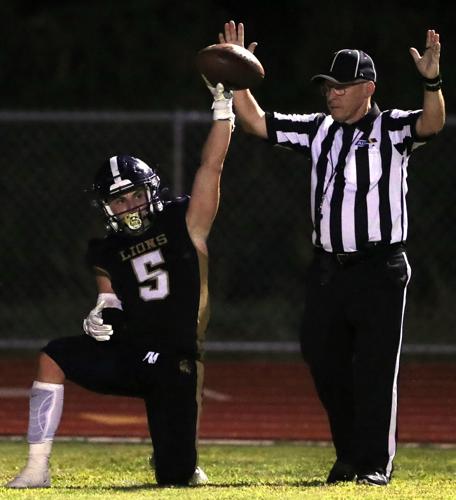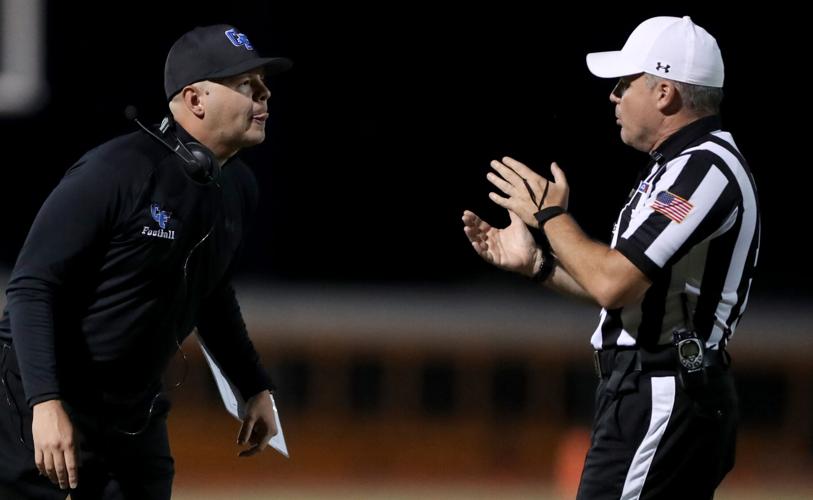Enjoy sports? Looking for part-time work? Hoping to get more exercise?
Why not be a high school sports referee in Tucson? If you work a varsity basketball, football or soccer game you will be paid $85 per game, plus mileage. That’s roughly $100 for two hours of work.
You are needed; your hometown high schools need your help.
The historic shortage of high school officials in Tucson is such that those officiating varsity basketball games are also needed to work junior varsity games two hours earlier. That’s another $50. Try to get that much from a part-time job at Chipotle or Subway.
The lack of officials is forcing the shift of some 2022-23 high school basketball and soccer games normally played on Fridays to Saturdays or even Monday.
“We’re struggling,” says Dave Whatton, commissioner of Tucson area officiating for the Arizona Interscholastic Association. “Since the middle of the football season I’ve needed to find three or four officials every week from outside the Tucson area to help officiate our games, and that’s with me using brand new officials, those not yet certified to do varsity games.
“Sometimes it brings nastiness and a real lack of sportsmanship out of the stands.”
A few days ago, Whatton held the annual basketball tip-off meeting with Southern Arizona officials. There were 136 referees.
“We need about 180,” he says. “The numbers are really, really bad.”
If you scan the list of Southern Arizona’s 15 football certified officiating crews — each with five referees — the names of highly accomplished officials such as Bill Carson, Jerry Gastellum, Boyd Morse, Bob Bertagnoli, BJ Fogltance, Jim Purdy and Chris Schagel would make you think nothing has changed to Tucson’s historical excellence of high school sports officiating.
But times change. Fewer and fewer younger officials are entering the system. Whatton says that considerably more than half of Tucson officials are 55 or older.
Tucson Final Four basketball referee Chris Rastatter, newly named as coordinator of all NCAA men’s basketball officials, says that the culture around AIA and high school sports has been altered by the abusive behavior of parents and fans.
“It’s turning young officials away,” says Rastatter, who grew up officiating Tucson high school games and remains director of the Tucson Youth Officiating Program. “The number of entry-level officials is declining.”
If the officiating numbers in football are bad, they’ll be worse when high school soccer and basketball begin next month. Both of those sports have multiple games each week.
“We won’t have enough officials to cover JV and varsity games for those sports,” says Whatton. “In about 80% of the games we scheduled for soccer last year, we were forced to use two-person officiating crews instead of three-person crews. This is happening all over the state.”
That is a dramatic change from previous decades, when prominent Tucson athletes such as Terry Francona and Ed Vosberg, both major-league baseball players, began working their way through the officiating system.
“We were all clamoring for more work, more games, “ says Whatton, a Flowing Wells High School graduate who began officiating 30 years ago. “Back then, you were happy when you got to work two games a week, and that was even the case with people like Terry Francona. Now you could work five days a week on freshman, JV and varsity games. The need is that critical.”
The two-year reduction and shutdown of games for COVID-19 became a big part of the problem. For whatever reasons, scores of Tucson officials did not return to the AIA system after the 2019 and 2020 high school seasons.
Tucson has sustained its officiating excellence for almost 100 years. The list of well-known Tucson officials began in 1926, when UA quarterback Button Salmon’s backup, Ralph Deal, embraced the profession and became one of the leading officiating figures in Arizona and the Southwest for 40 years.
Deal triggered an impressive procession of Pima County Sports Hall of Fame officials such as Bud Grainger, Gordon Overstreet, Don Moore, Dean Metz, Jim Markert, Pat Flood, Ed Hochuli, Bobby Rauh, Boyd Baker, Jim Fogltance, Bob Scofield and Rastatter.
It seemed like Tucson was forever endowed to be one of America’s leading cities for high school sports officials.
And then it all came apart.
“Another problem is that the new people we get are rushed to varsity assignments,” says Whatton. “Normally it takes at least two years working freshman and JV games before you can put a person in a varsity game. Now, because the numbers are so far down that we put too many new officials into varsity situations before they are properly trained. The sports itself suffers.”
Whatton and the AIA are busy recruiting younger officials. The AIA website has a page it labels “Become an Official,” explaining the process to do so. Those recently graduated from high school are not charged a registration fee. Locally, Amphitheater High school athletic director David Humpreys recently recruited 16 former Panthers athletes to become beginner officials.
“What I tell the younger, prospective officials is that you can make more money in less time as an official than you can working at Starbucks or McDonalds,” said Whatton. “My feeling is that if we can get them for three years, they’ll be hooked.”





